Andrew Motion
Short stories seem to fare better in the US than the UK, and among this year’s rich crop, Deborah Eisenberg’s Your Duck is My Duck (Ecco, £20.70) is outstanding.
Everything about Eisenberg’s writing is highly controlled — watchful, well-made — and everything it describes teeters on the verge of chaos or collapse. It makes for a brilliant mixture of a book — at once compact and capacious, eerily familiar and extremely strange.
Roger Lewis
One of my favourite authors is Laura Thompson. Her biographies of sundry Mitfords, of Agatha Christie and Lord Lucan (recently revised in the light of the unpleasant Countess’s demise) are brilliant and forensic. This year she published a memoir of her grandmother, The Last Landlady (Unbound, £16.99), which is a typically eclectic mix of social history and elegy, ironic comedy and indelible Englishness. It is about the pub as theatre, and like everything else worth cherishing, pubs are closing down — replaced with gender-neutral lavatories, compulsory veganism and virtue-signalling teetotalism.
A Hero for High Times (Cape, £16.99), Ian Marchant’s account of being a wild old hippie with a bucket for a toilet in a copse on the Welsh Marches, made me laugh.
Matthew Sturgis’s biography of Oscar Wilde, Oscar: A Life (Head of Zeus, £25) made me furious. How idiotic to trail this book as putting Richard Ellmann right, when it is full of copycat flourishes. Ellmann, for example, in 1987, called Bosie Douglas ‘totally spoiled, reckless, insolent and, when thwarted, fiercely vindictive’. Sturgis now says Bosie was ‘selfish, spoilt, vain, intemperate, needy and demanding’. It is like a bad translation.
Richard Davenport-Hines
Andrew Wynn Owen, a young Fellow of All Souls, has produced an exhilarating first book of poems, The Multiverse (Carcanet, £9.99). It won’t appeal to austere modernists who value solemn obscurity. Owen writes in strictly observed metres and in disciplined rhyme. He has an almost miraculous ear for the sounds of words and their harmonies together. There is bounding vitality, surgical precision and coquettish wit in every stanza. Like all great poets in the making, Owen is a magpie, who plucks eye-catching sparklers from old masters such as Herbert, Hardy and Auden. I hear the exuberant, taunting laugh of Byron in some rhymes. Several of my favourites, such as ‘A Sign at CERN’, are about science. I know that it will make a wonderful Christmas present because I have given it to three people — an Oscar-winning screenwriter, a former cabinet minister and a retired head of English at Wycombe Abbey School for Girls — who have all revelled in Owen’s glorious ingenuity and joy-of-life.
Jenny Colgan
Normally I am tremendously bad at predicting what will do well, but I fell in love with Richard Powers’s The Overstory (Heinemann, £18.99) very early on, and went around recommending it madly. I think it’s the real deal, and I appreciate the flamboyant publishing confidence that went in to letting it run to 500-odd pages, particularly the number of trees you have to kill to let it do so. Julia Boyd’s Travellers in the Third Reich (Elliott & Thompson, £10.99) was fascinating and scary, given the world we’re living in now.
Although it’s been out for a couple of years, I bought Jim Baggot’s Atomic: The First War of Physics (Icon Books, £9.99) to dip into for something I was researching, but immediately had to sit down at the beginning and devour it; every single page is eye-popping. I also happily joined the Dorothy Whipple revival this summer, and was very pleased that I did.
In my overrated pile I finally got started on Stendhal’s The Red and the Black. If anyone could tell me when it gets good, I’d be wildly appreciative.
Daniel Hahn
Amy Sackville’s Painter to the King (Granta, £14.99) tells the story of Diego Velázquez’s long service at the profligate court of
Philip IV of Spain, and asks the big questions about art, artifice, reality and posterity along the way. It’s an immersive and richly evocative imagining of a period, but also brilliantly inventive, and with a really seductive self-assurance to its voice.
Several great international children’s books have made it belatedly to the UK this year — one of my favourites was A Good Day for Climbing Trees by Jaco Jacobs, translated from the Afrikaans by Kobus Geldenhuys (Rock the Boat, £6.99), about a couple of unlikely young activists fighting to save a tree. It’s an inspiring story, and a really funny one, too. And finally, just out, a Christmassy treat from the great Catherine Fisher: The Clockwork Crow (Firefly, £6.99). Gripping and magical, a perfect snowy holiday read for children (and me).
Hilary Spurling
I choose Victoria Glendinning’s The Butcher’s Daughter (Duckworth, £16.99), the enchanting, unputdownable fictional biography of a girl thrown out to make her own way in the world with nothing and no one to help her when Thomas Cromwell shut down the nunneries in the 16th century.
Michela Wrong
Democracy is globally in retreat while elections are all the rage, thanks to the increasingly sophisticated techniques that ruling parties and authoritarian regimes use to predetermine poll results. So How to Rig an Election by Nic Cheeseman and Brian Klass (Yale, £18.99) is not just a fascinating read, but offers opposition parties, civil society and voters precious tools to preempt the worst abuses, spot when the fix is in, and analyse the extent of the theft. Lindsey Hilsum, one of the finest foreign correspondents of her generation, profiled another with In Extremis: The Life of War Correspondent Marie Colvin (Chatto, £20). Colvin, who died in a rocket attack in Syria in 2012, saw Martha Gellhorn as her model, but the parallels were probably closer with the adrenaline-fuelled, hard-drinking, eventually suicidal Ernest Hemingway, Gellhorn’s husband.
Iconoclastic reportage by feisty North American women was a bit of a theme this year, with two polemical books challenging Rwanda’s image as Africa’s developmental poster-boy. Judi Rever’s In Praise of Blood (Random House Canada, £18.90) accuses the guerrilla movement which took control after Rwanda’s genocide of commiting mass atrocities of its own, while Susan Thomson’s Rwanda: From Genocide to Precarious Peace (Yale, £20) explores the texture of daily life in one of the world’s most tightly controlled states.
I relished Peter Martell’s First Raise a Flag: How South Sudan Won the Longest War but Lost the Peace (Hurst, £25), which examines how Africa’s newest nation state plunged back into civil war so soon after its hopeful, excited birth. Martell spent more than a decade reporting the story and it’s an account full of vivid, telling detail.
Clare Mulley
Written on the shores of Lake Lucerne in 1943, but only published in English this year, François Frenkel’s No Place to Lay One’s Head (Pushkin Press, £16.99) is the memoir of a book-loving Polish Jew trapped in France by the Nazi advance. Incredibly, he survived the war to write this poignant love letter to literature, freedom and shared humanity.
Volker Weidermann’s Dreamers: When Writers Took Power, Germany, 1918 (Pushkin Press, £16.99) is a compelling account of the extraordinary months between 1918 and 1919 when left-leaning intellectuals dared to dream of a writers’ republic, before events descended into further nightmare.
A lighter read is Corey Mead’s The Lost Pilots: The Spectacular Rise and Scandalous Fall of Aviation’s Golden Couple (Macmillan, £20); a hugely entertaining whodunit, peopled by pioneering pilots, Depression-era swindlers and fast-talking lawyers.
Lastly, Robert Harris’s Munich (Arrow, £8.99) recasts events in 1938 to cloak a reassessment of Chamberlain in a compelling tale of espionage.
Christopher Howse
The evidence deposed by an unjustly hanged sheep-drover — that Henry VI (from heaven) supported his feet on the gallows and saved his life — almost brought that king to sainthood and his remains into the chapel built for him at Westminster Abbey, since occupied by Henry VII’s tomb. This is a single tessera in the bright mosaic put together by Eamon Duffy in his wonderfully lucid Royal Books and Holy Bones: Essays in Medieval Christianity (Bloomsbury Continuum, £25).
Oddly enough the same mosaic craft is deployed in Ma’am Darling: 99 Glimpses of Princess Margaret (Fourth Estate, £9.99) by Craig Brown, who sifts grains of gold from evanescent British and American sources as though they were fragments of a medieval cartulary. The labour is concealed in the funny, shocking and painful picture that results.
Mark Amory
Greatly to my surprise, I have read, been impressed by and actually enjoyed A Certain Idea of France: The Life of Charles De Gaulle by Julian Jackson (Allen Lane, £35). He is the least charming hero I have ever followed that long but you cannot help admiring him in the end. The protagonist of The Spy and the Traitor by Ben Macintyre (Penguin/Viking, £25) is not entirely congenial either, but Oleg Gordievsky (who reviewed for The Spectator) is the most important Soviet spy we ever recruited and has led a fascinating double life with the most exciting bid for freedom at the end that I can remember.
Standard Deviations by Katherine Heiny (Fourth Estate, £12.99) is light relief — deft comedy about the marital adventures of a couple whose son goes to origami classes to help with his Asperger’s. In an earlier story Heiny appeared to say that she could not write a novel; she certainly can.
Stephen Bayley
So many, many books this year, but few making a compulsive proposition. An exception, at least for amateurs of Americana, was Making LA Modern: Craig Ellwood — Myth, Man, Designer by Michael Boyd (Rizzoli, £50). Craig Ellwood? There was no such person. He was the invented persona of one Johnnie Burke: the ‘Ellwood’ came from a liquor store and ‘Craig’ because it sounded like an astronaut. Ellwood became the Cary Grant of architecture, a playboy designer whose Ferrari’s vanity plate was VROOM. But his California houses, pristine glass boxes gorgeously photographed by Julius Shulman, are the best memorial of mid-century America, or, at least, a fantasy version of it. Look carefully now at the ocean-front Hunt House of 1957 at 24514 Malibu Road: weeds are growing through the concrete, cracks and faults in the American Dream. And it was recently threatened with demolition. A beautiful book of haunting pictures and a nagging sense of loss. Ellwood also designed the celebrity petting zoo that is the Chateau Marmont Bungalows in LA, which some of you may know.
John Sutherland
Janet Todd’s Jane Austen scholarship will be consulted as long as Pride and Prejudice is read. Todd received, in close succession, three cancer diagnoses. Damocles was lucky to have only one sword over his head. Radiation Diaries: Cancer, Memory and Fragments of Life in Words (Fentum Press, £8.99) records a month’s pelvic radio therapy — ‘indecorously and excrementally’. Does Austen help?
Caroline Slocock was Thatcher’s aide during the Iron Lady’s Untergang. People Like Us: Margaret Thatcher and Me (Biteback, £20) records the downfall (all the toilet paper in No 10 was sniffled away on the day she left). The title quotes one of Mrs T’s HR criteria. Slocock was not ‘like us’ but felt for Thatcher as a woman. A unique, unwarty political portrait.
The Maybot clanks on unstoppably. John Crace’s satirical image has passed the definitive sales test — it’s been stolen. Universalised. ‘I am not a robot,’ Theresa May feebly protested. If the annual Samuel Johnson Prize were the Jonathan Swift Prize I, Maybot (Guardian/ Faber, £7.99) would win it hands down. Satire lives.
Cressida Connolly
Putney by Sofka Zinovieff (Bloomsbury, £14.99) is Lolita in reverse: a novel for the #MeToo age which addresses the minefield of sexual consent. Zinovieff handles this difficult subject with control, insight, wisdom and sympathy. Growing up in a bohemian household in 1970s London, the heroine is (what we now understand to be) groomed by a charismatic family friend. For anyone who came of age in that era, this can be an uncomfortable read, as well as an utterly fascinating one. I think it’s the best novel of 2018, by far. I also loved Anne Tyler’s Clock Dance (Chatto, £18.99).
Allan Mallinson
Napoleon: The Man Behind the Myth by Adam Zamoyski (William Collins, £30).Another biography of Napoleon? Yes, but Zamoyski is ever defiant: ‘The British have a penchant for making a hero out of a loser.’ A Polish home, English schools and holidays with French cousins exposed Count Zamoyski from an early age to ‘violently conflicting visions of Napoleon’ (godlike genius, romantic avatar, evil monster, nasty little dictator). He concludes that ‘Napoleon was a man, and while I understand how others have done, I can see nothing superhuman about him’. Aristocratic disdain for a provincial youth? Perhaps; but compelling.
The Indian Empire at War by George Morton-Jack (Little, Brown, £25) is another impressive myth-busting book. First world war sepoys didn’t die like flies for an unrewarding cause: casualties were comparatively small, and many regarded their time in France as far more congenial — and safer — than rural India. One British civil servant in the Punjab wrote afterwards: ‘In widening the minds of those who served abroad, the war helped introduce a new humanity into village life.’
Antony Beevor
My book of the year has to be Max Hastings’s Vietnam: An Epic Tragedy (Harper Collins, £30). I know how Max, an old friend, has worked on this like a man possessed and it is his masterpiece. Unlike many of his colleagues reporting from the war in the 1970s, he never fell for the suggestion that, because the South Vietnamese government was utterly corrupt, the North Vietnamese communists would be any better. From Indochina at the end of the second world war through to the scramble for helicopters on the US embassy roof in 1975, he manages with great skill to combine the accumulation of strategic and political disaster with the real experience of those fighting on the ground.
Peter Frankopan
I greatly enjoyed Ben Macintyre’s The Spy and the Traitor (Penguin/Viking, £25). As with his other books, Macintyre seems not only able to find amazing new material, but to write perfectly paced prose that reads like a thriller. The same was the case for Henry Porter’s Firefly (Quercus, £14.99), a brilliant novel for our times that I could not put down, about terror threats, refugees and the challenges of the security services in the 21st century. My colleague Christian Sahner has written a remarkable book, Christian Martyrs under Islam (Princeton, £30) that draws on little known sources to explain the transformation of the Middle East from the seventh century onwards; terrific stuff.
Philip Hensher
The two best novels of the year are both Australian. Tim Winton’s The Shepherd’s Hut (Picador, £14.99) is a transfixing performance. It’s brutal and shocking in its subject, but if you write sentences with Winton’s musicality, inventiveness and vividness, any reader will stay with you.
Michelle de Kretser’s surprising and profound The Life to Come (Allen & Unwin, £16.99) has an unfashionable aspect; it is richly funny, and excoriating about current pieties. The lucidity and joy of de Kretser’s prose, too, is a wonder to behold.
Apart from English-language fiction, I recommend a chaotic, furious, extraordinary Bengali confection by Shirshendu Mukhopadhyay, The Aunt Who Wouldn’t Die (BEE Books, £6.99 on Amazon), translated by Arunava Sinha; a family teetering between impoverished gentry and shameful shopkeeping, a stolen box of gold, a ghost…. Irresistible.
At a time when seriousness seems increasingly confused with the inability to crack a joke, the non-fiction I most admired was at least open to the possibility of laughter. Keith Thomas’s In Pursuit of Civility, (Yale, £25) about the sense of good behaviour between dinner table and imperial jurisdiction, is a marvel of knowledge and conceptual daring, one of the most entertaining books imaginable.
Merve Emre’s drily witty life of the frightful creators of the Myers-Briggs psychology test,What’s Your Type? (William Collins, £20), struck me as brilliant and savage. And of course, like everyone else, I was obsessed with the full publication, at last, of James Pope-Hennessy’s private notes and interview transcripts for the preparation of his great biography of Queen Mary, edited by Hugo Vickers (The Quest for Queen Mary, Zuleika, £30). They brought a lost world of European royalty to life like nothing else.
Anna Aslanyan
The Unmapped Country by Ann Quin (And Other Stories, £10), a collection of little known ‘stories and fragments’, takes its title from a novel Quin left unfinished when she died in 1973. Treading the barely perceptible line between sanity and madness, moving nimbly from the everyday to the imaginary and back, these inimitable pieces demonstrate that British literature has an experimental tradition worthy of the European modernist canon.
Reaching these shores from France, Mathias Enard’s novella Tell Them of Battles, Kings and Elephants (Fitzcarraldo Editions, £10.99) is an elegant, passionate love letter to world civilisation and its agents, most prominently Michelangelo, whose sojourn in Constantinople in 1506 infused his work with oriental poetry. Charlotte Mandell’s translation is yet another proof that great books can, and should, travel.
Duncan Fallowell
The new Warhol exhibition at the Whitney comes with a stirringly beautiful book, Andy Warhol: From A to B and Back Again (Yale, £50), packed with many lesser known images alongside the classics, to remind us that he is America’s greatest artist, its first to owe nothing to European traditions. It was an error to use the famous subtitle of Warhol’s own superb book; but apart from that, these pages constitute a living joy.
Patrick Modiano’s short, eerie fictions seem to be facets of one long novel, and all are irresistible, including his latest, Sleep of Memory (Yale, £16). Only a Frenchman could make nostalgia so avant-garde.
How wonderful to mark the revival of a spectralist 1890s poet from one’s own nostalgic youth, in Incurable: The Haunted Writings of Lionel Johnson, the Decadent Era’s Dark Angel (Strange Attractor Press, £14.99), edited by Nina Antonia.
Peter Parker
The funniest book I read this year was The Quest for Queen Mary (Zuleika, £30), assembled by Hugo Vickers from the records James Pope-Hennessy kept of the interviews he conducted while researching his biography of George V’s formidable consort. Packed with Pope-Hennessy’s sharp character portraits and his often barmy interviewees’ gloriously unguarded anecdotes and observations, the book evokes a now unimaginable world in which privilege went hand in hand with deference and privacy.
The long overdue first appearance in English of Giorgio Bassano’s Il romanzo di Ferrara in a single volume, as the great Italian Jewish writer always intended, was very welcome. Translated by Jamie McKendrick as The Novel of Ferrara (Penguin, £25), it consists of four novels and two collections of stories, all suffused with Bassani’s melancholia and sly wit.
Treat of the year was David Cole’s sumptuous Sir Edwin Lutyens: The Arts and Crafts Houses (Images Publishing, £65).
Julie Burchill
When I gave up cocaine some years back, I replaced it with another habit — psychological thrillers, all merging into one big Woman in Peril/Under the Influence/As Unreliable Witness smog. I was happy enough. But this year, I found I couldn’t finish them: easy reads had become an effort and I’ve been delighted to rediscover clever books.
My favourites were two collections of short stories: Property by Lionel Shriver (The Borough Press, £14.99) and You Think It, I’ll Say It by Curtis Sittenfeld (Doubleday, £16.99), both extraordinary performances which appear effortless, like excellent ice-dancing. I got feelings from them I hadn’t had in ages: the fervent desire to be friends with the authors, followed closely by an equally strong urge to swerve them, so scalpel-sharp are their observations. I’m never going to read a boring old thriller again — only books which give me an actual thrill with their intelligence, and for this reason I also loved Greg Healey’s Not In Front of the Children (New Haven Publishing, £12.99) – a vivid, playful and engaging history of tots’ TV.
Thomas W. Hodgkinson
The Mind is Flat: The Illusion of Mental Depth and the Improvised Mind by Nick Chater (Allen Lane, £25). Terrible title, brilliant book. Nick Chater’s argument is that we don’t understand anything, least of all ourselves. On the plus side, our minds are fantastically gifted story-making machines, constantly seizing on slivers of data and spinning general theories out of them. It’s beautifully written, and you’ll be able to bore your relatives rigid with your new theories of cognition over the Christmas turkey.
My Unwritten Books by George Steiner (Weidenfeld, £14.99). In this slim, delightful volume, which appeared ten years ago, the great critic tells us about books he almost wrote but, for one reason or another didn’t. And sometimes we’re relieved. There’s a chapter entitled ‘The Tongues of Eros’, in which Steiner speculates about the different experiences of love-making, depending on the language you’re speaking in the sack. It’s excruciatingly autobiographical.
Frances Wilson
Frances Welch has not only cornered the market in understated Romanov micro-histories, but appears to have created a distinct genre. The Imperial Tea Party: Family, Politics and Betrayal (Short Books, £12.99) is her fifth close encounter with the family of Nicholas II and his wife Alexandra, favourite granddaughter of Queen Victoria. Pursuing the details with the dogged persistence of a sleuth, Welch homes in on the final meetings between the Saxe-Coburgs and their doomed kinsmen: in sodden Balmoral in 1896, when Alex and Nicky visited Granny with their baby, the Grand Duchess Olga; in Reval, Estonia in 1908, when the rotund Edward VII (known as ‘Tum Tum’) moored the Royal yacht for a two-day family reunion; and on the Isle of Wight in 1909, where the Tsar was advised, for his own safety, to remain on board the imperial boat. With her quick wit and light touch, Welch conducts a relentless inquiry into conscience, family loyalty and the nature of the past. The result is an unsettling portrait of moustaches, murder, and lèse-majesté.
Mark Mason
The highlight in fiction was Scoundrels: The Hunt for Hansclapp (Black Door Press, £8.99). Major Victor Cornwall and Major Arthur St John Trevelyan are back, bickering and boasting as they encounter kidnapping in the Congo, manslaughter on the Orient Express and romance at the Stasi Christmas party. Duncan Crowe and James Peak once again pull off the balancing act achieved by only the very best spoofs — making it real enough to be believable, ridiculous enough to be funny. This time Trevelyan confides that his skin is unnaturally thick. ‘Ursula Andress once breathily described it as “like a jockey’s bollocks”.’
The non-fiction prize goes (as usual) to the QI elves. Their podcast ‘No Such Thing as a Fish’ has spawned The Book of the Year (Random House, £12.99). We learn that guests at Snapchat’s New Year party were banned from posting pictures on Snapchat.
Craig Raine
Thom Jones died in 2016. He wrote three volumes of short stories, The Pugilist at Rest, Cold Snap and Sonny Liston was a Friend of Mine. Night Train (Faber, £14.99) is a selection, plus seven new stories. At his best, Jones writes like Isaac Babel — unflinching, expert, brutal, objective reports on damage, physical and psychological. He was a Marine; Babel was with Budyonny’s Red Cavalry. Both writers knew whereof they spoke.
Got something to add? Join the discussion and comment below.
Get 10 issues for just $10
Subscribe to The Spectator Australia today for the next 10 magazine issues, plus full online access, for just $10.
You might disagree with half of it, but you’ll enjoy reading all of it. Try your first month for free, then just $2 a week for the remainder of your first year.

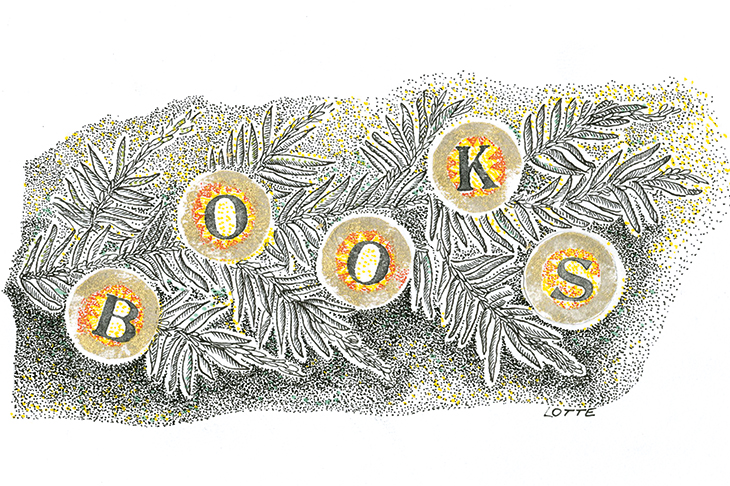
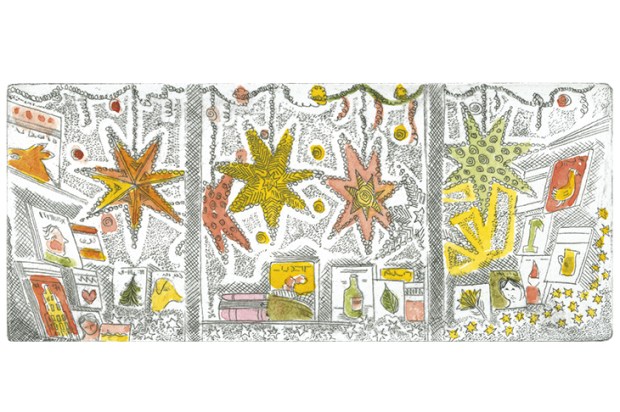
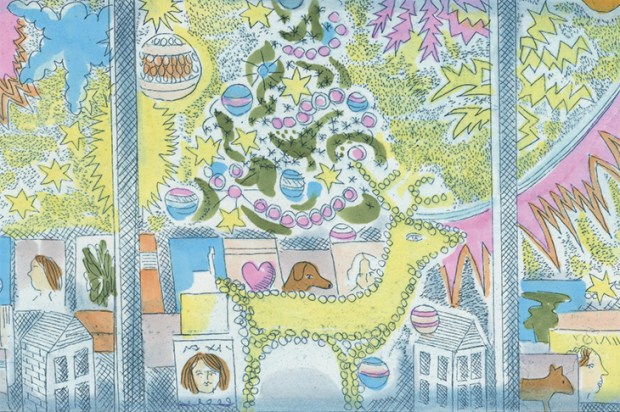
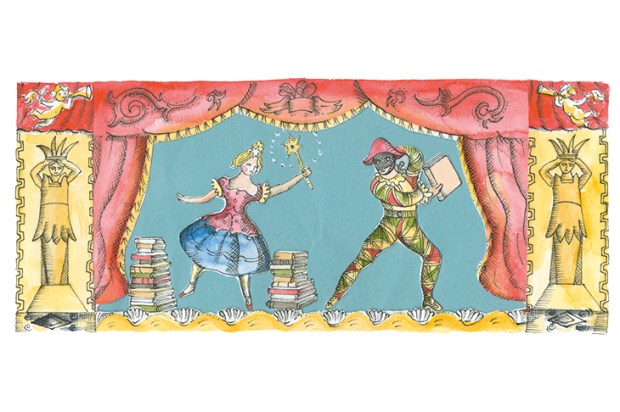

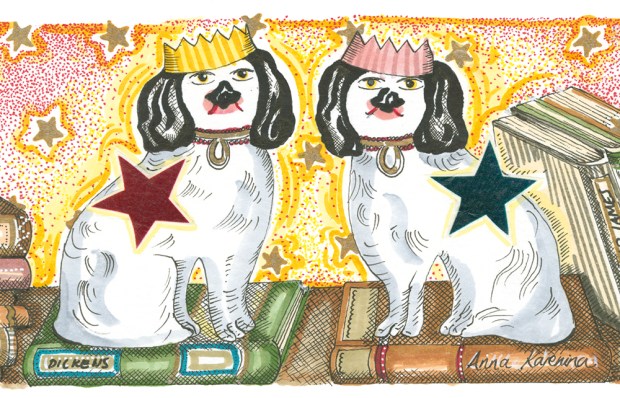
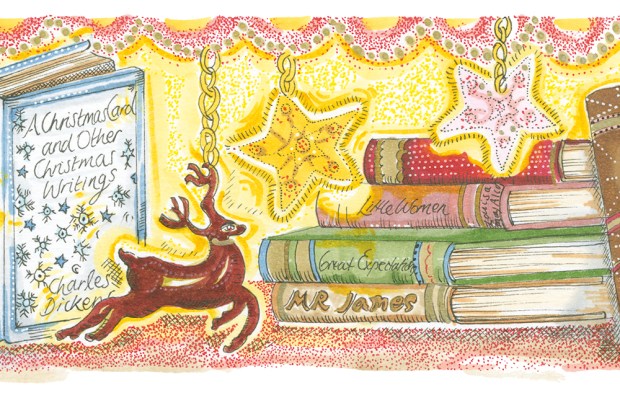






Comments
Don't miss out
Join the conversation with other Spectator Australia readers. Subscribe to leave a comment.
SUBSCRIBEAlready a subscriber? Log in